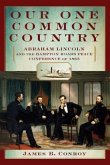Although Abraham Lincoln is one of the most well known American presidents, he may also be one of the least well understood. Ever since his death, biographers have continually re-crafted Lincoln's image and have come to widely divergent conclusions about him. How could the statesman-like Lincoln who demanded a soft approach to war become the callous Lincoln who waged Total War? How could the humanitarian Lincoln who pledged "malice toward none" and "charity toward all" justify war against Southern civilians? How could a president who pledged not to abolish slavery end up freeing slaves? Such apparently contradictory tendencies have led historians to characterize Lincoln as everything from the "Great Emancipator" to a racist tyrant. However, these seemingly contradictory actions make sense when placed in the proper context. Lincoln was a war president. Managing the war effort was the most important part of his job. He had to strategize to keep the nation together. John Hay, Lincoln's personal secretary, once described Lincoln's role in a poetic way: "The old man sits here and wields like a backwoods Jupiter the bolts of war...."
Bitte wählen Sie Ihr Anliegen aus.
Rechnungen
Retourenschein anfordern
Bestellstatus
Storno




